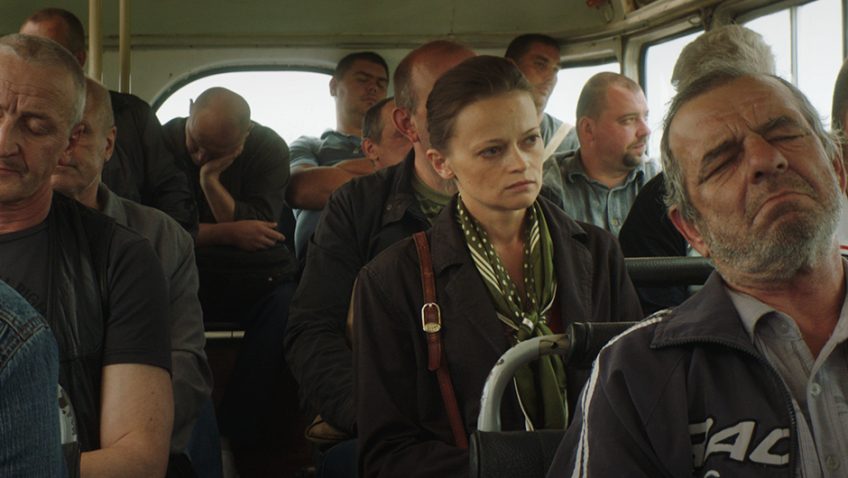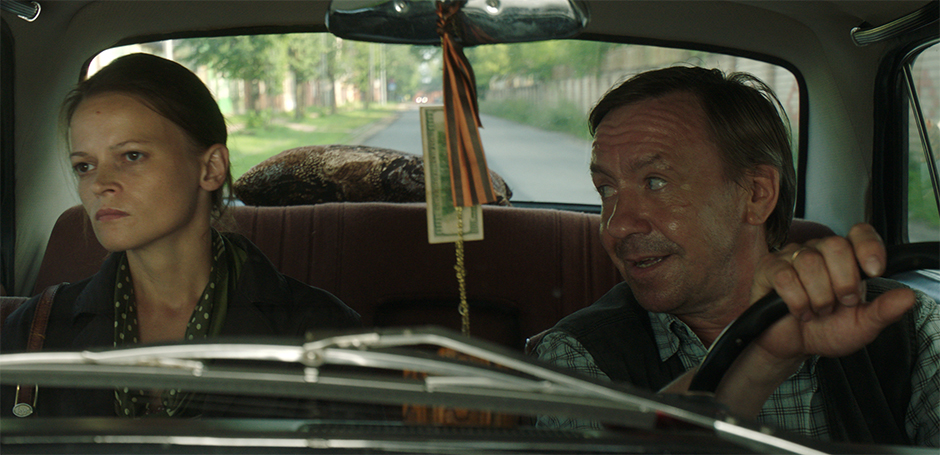Joyce Glasser reviews A Gentle Creature (Krotkaya) (April 13, 2018) Cert. 18, 143 min.
After Russian writer/director Andrey Zvyagintsev’s Loveless it was hard to imagine another Russian-born director trumping the abject misery, and spiritual emptiness of that state of the nation film. Yet just two months after the release of Loveless, Sergey Loznitsa does just that. Both writer/directors were born in 1964 at the height of the cold war (Loznitsa was born in Soviet Belarus, but his family moved to the Ukraine when he was still young and he now lives in Germany). Their films are commentaries on the corrupt, inhumane and nihilistic Soviet system into which they were born and which has continued, if not intensified, under Putin.
Loznitsa might not have Zvagintsev’s status (his last two films have been nominated for Academy Awards), but Loznitsa’s My Joy, was the first film from the Ukraine to be nominated for the prestigious Palme D’Or. Both In the Fog and A Gentle Creature
were nominated for the prestigious Palme D’Or at the Cannes Film Festival.
To describe A Gentle Creature as a cross between Kafka’s The Trial and the dystopian world of Mad Max: Fury Road is to underestimate its bleakness. Joseph K’s futile attempt to discover the crime of which he is charged is met with cruel indifference. Here, a woman’s (Vasilina Makovtseva) quest to find her husband, who is convicted of a murder that she insists he did not commit, is frustrated by calculated cruelty. Both Kafka’s novel (with its echoes of Crime and Punishment) and Loznitsa’s film were inspired by Dostoyevsky although the relationship between Loznitsa’s film and Dostoyevsky’s short story of the same title is not immediately apparent.
A sad-eyed brunette in her thirties does nothing to accentuate her attractive face and figure. Her straight hair is pulled back over a gaunt, stern and make-up free face. The woman lives a frugal, lonely existence with her dog in a run-down, remote house (given the controversial subject matter, the film was shot in Latvia). Returning home one day she receives a notice a package she had sent to her husband was returned and she must make travel back into town to pay for it and collect it.
Throughout the film we hear snippets of radio programmes and conversations suggesting a nationalist, closed-minded, brain-washed population. On the radio: ‘You think Russians can’t aim? There are many ways to blow up America with a single missile.’ Later on a group of women discuss how the French are savages who eat squealing snails while someone comments, ‘it’s all lies made up on America.’ The period is ambiguous.
After a long wait behind starving pensioners, the woman is handed the package with no explanation as to why it was returned. On the crowded bus ride home, her bulky package sparks an anecdote about a dead man transported to the cemetery on the bus by a family too poor to pay for a hearse.
The woman decides to travel to the prison, both to find out why the parcel was returned and to give it to her husband in person. You could compare the journey to that of Mad Max: Fury Road, only his companions had courage, honour and altruism whereas Alyonka is surrounded by imbeciles straight out of Hieronymus Bosch painting. It is a view of hell on earth from start to finish, only there is no real ending. Life in Russia is a cyclical nightmare in which there is no truth.
Before boarding the overcrowded train to the prison the woman is strip searched and questioned. Most people joke with the guards but the woman (at one point, she gives her name as Alyonka) answers in monosyllables as though refusing on principle to play a two-faced system she abhors. When she arrives in the prison town a taxi driver jauntily tells her: ‘This prison is sacred. What would you do in this town without it? It helps people live. People like you come and I earn a living.’
Another slow queue to a small window where parcels are searched. A pudgy woman with malicious eyes and bleached yellow hair takes her searches very seriously, punching holes in a pair of slippers with gusto and ripping off the soles in the event a bit of cocaine powder had been inserted. A can of beans is opened, poured out and then returned to the can, seriously reducing its shelf life. When it’s Alyonka’s turn, the woman shuts the window. Alyonka protests, pleading to know if her husband is even in the prison. ‘You’ll have to make an inquiry,’ she is told.
When a scary looking fat woman named Zinka (Marina Kleshcheva) approaches to extend a sympathetic invitation to rent an affordable room at her hostel, Alyonka, exhausted and despondent, has no choice but to accept. The hostel is a boisterous brothel full of grotesque women who throw themselves at a man who forces Alyonka into a game of spin the bottle. When she tries to escape she is cornered by a pimp who offers a conduit to information in exchange for what we can only imagine.
Even a human rights charity can offer little hope. The kindly septuagenarian (brilliantly played by Liya Akhedzhakova) ends up breaking down in tears over her impossible work load, lack of funding and the hostile neighbours who regularly ransack the little office where files form a thick carpet on the floor.
Dostoevsky’s A Gentle Creature describes a generous pawnbroker who marries an impoverished client to keep her from an abusive marriage, but is rewarded with tragedy. Dostoevsky called it “A Fantastic Story” while adding that he also “considers it utterly realistic.” Maybe that mix of fantasy and reality (regular DoP Oleg Muto has a great time with the ‘dream’ sequences as well as the gritty neo-realist scenes) is why Loznitsa gets away with a period that feels like the 1970s, but for the odd mobile phone and computer. This suggests the notion of an unchanging and unchangeable country from the Tsar to Putin.
The problem with this, and Zvagintsev’s grim satire, Loveless, is that the fine line between entertainment, raising awareness and punishment is a thin one and Loznitsa tends to step on it. That his notion of hell becomes ours is a tribute to great filmmaking but also a kind of poisoned chalice.
You can watch the film trailer here:






